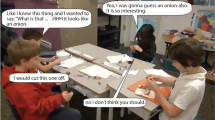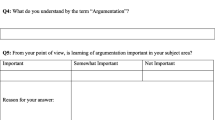Abstract
The purpose of this study is to develop a framework for analyzing classroom argumentation that includes a process of rebutting. A most commonly used framework to analyze argument in science education is Toulmin’s Argumentation Pattern. It is useful for analyzing argumentation but it cannot represent the complexity of students’ rebuttals during argumentations in the lessons. The study was conducted in three science stream classes of grade twelve students. The number of students in each class ranged from 39 to 40 students with a total of 119 students. The topics of the lessons were three biology contents that are closely related to socio-scientific issues, i.e., genetics, evolution, and biotechnology. Analyses of students’ rebuttals show that the newly developed Rebuttal Analysis Framework generated a better picture of classroom argumentation. In terms of the level of students’ argumentation, this study shows that argumentation-oriented lessons do not necessarily lead to the improvement of students’ argumentation competence. The study also identifies four types of argumentation changes, namely inert, contrary, under two positions, and impartial.





Similar content being viewed by others
Change history
13 April 2022
Springer Nature's version of this paper was updated to present the corrected article note.
References
Anisa, A., Widodo, A., & Riandi, R. (2017). Argumentation quality of socio-scientific issue between high school students and postgraduate students about cancer. In Journal of Physics: Conference Series (Vol. 895). Institute of Physics Publishing. https://doi.org/10.1088/1742-6596/895/1/012160
Aribowo, E. K., & Herawati, N. (2016). Trends in naming systems on Javanese Society: a shift from Javanese to Arabic. Lingua Cultura, 10(2), 117–122. https://doi.org/10.21512/lc.v10i2.1730
Aufschnaiter, C., Erduran, S., Osborne, J., & Simon, S. (2008). Arguing to learn and learning to argue: Case studies of how students’ argumentation relates to their scientific knowledge. Journal of Research in Science Teaching, 45(1), 101–131. https://doi.org/10.1002/tea.20213.
Bebeau, M. J., Pimple, K. D., Muskavitch, K. M. T., Borden, S. L., & Smith, D. H. (1995). Moral reasoning in scientific research: Cases for teaching and assessment. Indiana University, (December).
Berland, L. K., & McNeill, K. L. (2010). A learning progression for scientific argumentation: Understanding student work and designing supportive instructional contexts. Science Education, 94(5), 765–793. https://doi.org/10.1002/sce.20402
Braund, M., Scholtz, Z., Sadeck, M., & Koopman, R. (2013). First steps in teaching argumentation: A South African study. International Journal of Educational Development, 33(2), 175–184. https://doi.org/10.1016/j.ijedudev.2012.03.007
Cavagnetto, A. R. (2010). Argument to foster scientific literacy: A review of argument interventions in K-12 science contexts. Review of Educational Research (Vol. 80). https://doi.org/10.3102/0034654310376953
Cetin, P. S. (2014). Explicit argumentation instruction to facilitate conceptual understanding and argumentation skills. Research in Science and Technological Education, 32(1), 1–20. https://doi.org/10.1080/02635143.2013.850071
Chin, C., & Osborne, J. (2010). Supporting argumentation through students’ questions: Case studies in science classrooms. Journal of the Learning Sciences, 19(2), 230–284. https://doi.org/10.1080/10508400903530036
Chin, Yang, W. C., & Tuan, H. L. (2016). Argumentation in a socioscientific context and its influence on fundamental and derived science literacies. International Journal of Science and Mathematics Education, 14(4), 603–617. https://doi.org/10.1007/s10763-014-9606-1
Christenson, N., & Rundgren, C. (2015). A framework for teachers assessment of socio-scientific argumentation: An example using the GMO issue. Journal of Biological Education, 49(2), 204–212. https://doi.org/10.1080/00219266.2014.923486
Cinici, A. (2016). Balancing the pros and cons of GMOs: Socio-scientific argumentation in pre-service teacher education. International Journal of Science Education, 38(11), 1841–1866. https://doi.org/10.1080/09500693.2016.1220033
Clark, D. B., & Sampson, V. D. (2007). Personally-seeded discussions to scaffold online argumentation. International Journal of Science Education, 29(3), 253–277. https://doi.org/10.1080/09500690600560944.
Cross, D., Taasoobshirazi, G., Hendricks, S., & Hickey, D. T. (2008). Argumentation: A strategy for improving achievement and revealing scientific identities. International Journal of Science Education, 30(6), 837–861. https://doi.org/10.1080/09500690701411567.
Dawson, V., & Carson, K. (2017). Using climate change scenarios to assess high school students’ argumentation skills. Research in Science & Technological Education, 35(1), 1–16. https://doi.org/10.1080/02635143.2016.1174932
Du, F. (2017). The analysis of argument-counterargument structure in Chinese EFL learners’ argumentative writing. Journal of Studies in Education, 7(3).
Ellis, L. M. (2015). A critique of the ubiquity of the Toulmin model in argumentative writing instruction in the U.S.A. (pp. 201–214). https://doi.org/10.1075/aic.9.11ell
Erduran, S., Kaya, E., & Cetin, P. S. (2012). Discourse, argumentation, and science lessons: Match or mismatch in high school students’ perceptions and understanding? Mevlana International Journal of Education (MIJE), 2(3), 1–32.
Erduran, S., Kaya, E., & Çetin, P. S. (2016). Pre-service teachers’ perceptions of argumentation: Impact of a teacher education project in Rwanda. Boğaziçi University Journal of Education, 33(1), 1–21.
Facione, N. C., & Facione, P. A. (2008). Critical thinking and clinical judgment, 1–9.
Fang, S. C., Hsu, Y. S., & Lin, S. S. (2019). Conceptualizing socioscientific decision making from a review of research in science education. International Journal of Science and Mathematics Education, 17(3), 427–448. https://doi.org/10.1007/s10763-018-9890-2
Hefter, M. H., Berthold, K., Renkl, A., Riess, W., Schmid, S., & Fries, S. (2014). Effects of a training intervention to foster argumentation skills while processing conflicting scientific positions. Instructional Science, 42(6), 929–947. https://doi.org/10.1007/s11251-014-9320-y
Hitchcock, D. (2006). Good reasoning on the Toulmin model. Argumentation, 373–391. https://doi.org/10.1007/978-1-4020-4938-5_13.
Horng, R. Y., Lu, P. H., Chen, P. H., & Hou, S. H. (2013). The effects of argument stance on scientific knowledge inquiry skills. International Journal of Science Education, 35(16), 2784–2800. https://doi.org/10.1080/09500693.2012.671558
Keskin, M. Ö., Samanci, N. K., & Yaman, H. (2013). Argumentation based bioethics education: Sample implementation on genetically modified organisms (GMOs) and genetic screening tests. Educational Research and Reviews, 8(16), 1383–1391. https://doi.org/10.5897/ERR2013.1534
Khishfe, R. (2012). Relationship between nature of science understandings and argumentation skills: A role for counterargument and contextual factors. Journal of Research in Science Teaching, 49(4), 489–514. https://doi.org/10.1002/tea.21012
Kilinc, A., Demiral, U., & Kartal, T. (2017). Resistance to dialogic discourse in SSI teaching: The effects of an argumentation-based workshop, teaching practicum, and induction on a preservice science teacher. Journal of Research in Science Teaching, 54(6). https://doi.org/10.1002/tea.21385
Kim, M., & Roth, W.-M. (2018). Dialogical argumentation in elementary science classrooms. Cultural Studies of Science Education. https://doi.org/10.1007/s11422-017-9846-9
Knight, A. M., & Mcneill, K. L. (2015). Comparing students ’ individual written and collaborative oral socioscientific arguments. International Journal of Environmental and Science Education, 10(5), 623–647. https://doi.org/10.12973/ijese.2015.258a
Koeneman, M., Goedhart, M., & Ossevoort, M. (2013). Introducing pre-university students to primary scientific literature through argumentation analysis. Research in Science Education, 43(5), 2009–2034. https://doi.org/10.1007/s11165-012-9341-y
Kolbert. (2017). Why Facts Don’t Change Our Minds |. The New Yorker, 1–12. Retrieved from https://www.newyorker.com/magazine/2017/02/27/why-facts-dont-change-our-minds.
Kuhn, D. (2001). How do people know? Psychological Science, 12(1), 1–8.
Kuhn, D. (2010). Teaching and learning science as argument. Science Education, 94(5), 810–824. https://doi.org/10.1002/sce.20395
Kuhn, D., & Udell, W. (2003). The development of argument skills. Child Development, 74(5), 1245–1260.
Larrain, A., Freire, P., & Howe, C. (2014). Science teaching and argumentation: One-sided versus dialectical argumentation in Chilean middle-school science lessons. International Journal of Science Education, 36(6), 1017–1036. https://doi.org/10.1080/09500693.2013.832005
Lee, Y. C. (2010). Developing decision making skills for socio scientific issues. Journal of Biological Education, 41(4), 170–177.
Lin, Y. R., & Hung, J. F. (2016). The analysis and reconciliation of students’ rebuttals in argumentation activities. International Journal of Science Education, 38(1), 130–155. https://doi.org/10.1080/09500693.2015.1134848
Liu, D. (2020). What makes proficient writers’ essays more persuasive? A Toulmin Perspective, 2(July), 1–13. https://doi.org/10.46451/ijts.2020.06.01
Macagno, F. (2008). Dialectical relevance and dialogical context in Walton’s Pragmatic Theory. Informal Logic, 28(2), 102. https://doi.org/10.22329/il.v28i2.542
Macagno, F. (2016). Argument relevance and structure. Assessing and developing students’ uses of evidence. International Journal of Educational Research, 79, 180–194. https://doi.org/10.1016/j.ijer.2016.07.002
Macagno, F., & Konstantinidou, A. (2013). What students’ arguments can tell us: Using argumentation schemes in science education. Argumentation, 27(3), 225–243. https://doi.org/10.1007/s10503-012-9284-5
Nussbaum, E. M. (2011). Argumentation, dialogue theory, and probability modeling: Alternative frameworks for argumentation research in education. Educational Psychologist, 46(2), 84–106. https://doi.org/10.1080/00461520.2011.558816
Osborne, J. F., Henderson, J. B., MacPherson, A., Szu, E., Wild, A., & Yao, S. Y. (2016). The development and validation of a learning progression for argumentation in science. Journal of Research in Science Teaching, 53(6), 821–846. https://doi.org/10.1002/tea.21316
Osborne, J., Erduran, S., & Simon, S. (2004). Enhancing the quality of argumentation in school science. Journal of Research in Science Teaching, 41(10), 994–1020. https://doi.org/10.1002/tea.20035
Owens, D. C., Sadler, T. D., & Zeidler, D. L. (2017). Controversial issues in the science classroom. Phi Delta Kappan, 99(4), 45–49. https://doi.org/10.1177/0031721717745544
Ozdem, Y., Ertepinar, H., Cakiroglu, J., & Erduran, S. (2013). The nature of pre-service science teachers’ argumentation in inquiry-oriented laboratory context. International Journal of Science Education, 35(15), 2559–2586. https://doi.org/10.1080/09500693.2011.611835
Prakken, H. (2010). On the nature of argument schemes. Dialectics, Dialogue and Argumentation., 1–21. Retrieved from http://citeseerx.ist.psu.edu/viewdoc/download?doi=10.1.1.168.6608&rep=rep1&type=pdf
Qin, J., & Karabacak, E. (2010). The analysis of Toulmin elements in Chinese EFL university argumentative writing. System, 38(3), 444–456. https://doi.org/10.1016/j.system.2010.06.012.
Rahayu, D. P., & Widodo, A. (2019). The profile of scientific argumentation skill student’s using “Toulmin argumentation pattern” analysis in the solving energy problem on the students of class VII. ACM International Conference Proceeding Series, Part F1481, 161–165. https://doi.org/10.1145/3318396.3318421.
Ratcliffe, M. (1997). Pupil decision-making about socio-scientific issues within the science curriculum. International Journal of Science Education, 19(2), 167–182. https://doi.org/10.1080/0950069970190203
Rieke, R. D., Sillars, M. O., & Peterson, T. R. (2013). Argumentation and Critical Decision Making (Eighth Edi). Pearson.
Sadler, T. D. (2004). Informal reasoning regarding socioscientific issues: A critical review of research. Journal of Research in Science Teaching, 41(5), 513–536. https://doi.org/10.1002/tea.20009
Sadler, T. D., & Donnelly, L. A. (2006). Socioscientific argumentation: The effects of content knowledge and morality. International Journal of Science Education, 28(12), 1463–1488. https://doi.org/10.1080/09500690600708717
Sandoval, W. A., & Millwood, K. A. (2005). The quality of students’ use of evidence in written scientific explanations. Cognition and Instruction, 23(1), 23–55. https://doi.org/10.1207/s1532690xci2301_2
Schen, M. (2013). A comparison of biology majors written arguments across the curriculum. Journal of Biological Education, 47(4), 224–231. https://doi.org/10.1080/00219266.2013.788542
Simon, S. (2008). Using Toulmin’s Argument Pattern in the evaluation of argumentation in school science. International Journal of Research and Method in Education, 31(3), 277–289. https://doi.org/10.1080/17437270802417176
Simon, S., Erduran, S., & Osborne, J. (2006). Learning to teach argumentation: Research and development in the science classroom. International Journal of Science Education, 28(2–3), 235–260. https://doi.org/10.1080/09500690500336957
Sinnot-Armstrong, W., & Fogelin, R. (1980). Understanding arguments. Teaching Philosophy (Ninth Edit, Vol. 3). Stamford, CT USA: Cengage Learning. https://doi.org/10.5840/teachphil19803318
Toulmin, S. E. (2003). The uses of argument, updated edition (Update edi). Cambridge, United Kingdom: Cambridge University Press
Walton, D. (2009). Objections, rebuttals and refutations. In Argument Cultures: Proceeding of OSSA 09 (pp. 1–10).
Whithaus, C. (2012). Claim-evidence structures in environmental science writing: Modifying Toulmin’s model to account for multimodal arguments. Technical Communication Quarterly, 21(2), 105–128. https://doi.org/10.1080/10572252.2012.641431
Author information
Authors and Affiliations
Corresponding author
Ethics declarations
Conflict of Interest
The authors declare that they have no conflict of interest.
Additional information
Publisher's Note
Springer Nature remains neutral with regard to jurisdictional claims in published maps and institutional affiliations.
Anisa, Riandi, and Muslim, some names in Indonesia do not follow the convention of ‘first name’, ‘middle name’ and ‘family name’. The authors are referred to only as one name that is their unique identifier. For further information about naming conventions in Indonesia, see Aribowo & Herawati (2016).
Rights and permissions
About this article
Cite this article
Anisa, Widodo, A., Riandi et al. Students’ Argumentation in Science Lessons. Sci & Educ 32, 669–687 (2023). https://doi.org/10.1007/s11191-022-00320-8
Accepted:
Published:
Issue Date:
DOI: https://doi.org/10.1007/s11191-022-00320-8




